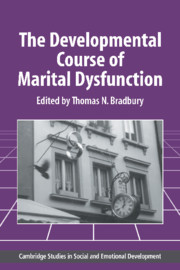Book contents
- Frontmatter
- Contents
- List of Contributors
- Foreword
- Introduction: The Developmental Course of Marital Dysfunction
- Part I Conceptual and Empirical Contributions
- 1 Communication in Early Marriage: Responses to Conflict, Nonverbal Accuracy, and Conversational Patterns
- 2 Marital Aggression, Quality, and Stability in the First Year of Marriage: Findings from the Buffalo Newlywed Study
- 3 Accommodation Processes During the Early Years of Marriage
- 4 The Psychological Infrastructure of Courtship and Marriage: The Role of Personality and Compatibility in Romantic Relationships
- 5 Happiness in Stable Marriages: The Early Years
- 6 Developmental Changes in Marital Satisfaction: A 6-Year Prospective Longitudinal Study of Newlywed Couples
- 7 The Development of Marriage: A 9-Year Perspective
- 8 Premarital Predictors of Relationship Outcomes: A 15-Year Follow-up of the Boston Couples Study
- 9 Optimizing Longitudinal Research for Understanding and Preventing Marital Dysfunction
- 10 Socialization into Marital Roles: Testing a Contextual, Developmental Model of Marital Functioning
- 11 Physical Aggression in Marriage: A Developmental Analysis
- Part II Invited Commentaries
- Author Index
- Subject Index
11 - Physical Aggression in Marriage: A Developmental Analysis
Published online by Cambridge University Press: 13 October 2009
- Frontmatter
- Contents
- List of Contributors
- Foreword
- Introduction: The Developmental Course of Marital Dysfunction
- Part I Conceptual and Empirical Contributions
- 1 Communication in Early Marriage: Responses to Conflict, Nonverbal Accuracy, and Conversational Patterns
- 2 Marital Aggression, Quality, and Stability in the First Year of Marriage: Findings from the Buffalo Newlywed Study
- 3 Accommodation Processes During the Early Years of Marriage
- 4 The Psychological Infrastructure of Courtship and Marriage: The Role of Personality and Compatibility in Romantic Relationships
- 5 Happiness in Stable Marriages: The Early Years
- 6 Developmental Changes in Marital Satisfaction: A 6-Year Prospective Longitudinal Study of Newlywed Couples
- 7 The Development of Marriage: A 9-Year Perspective
- 8 Premarital Predictors of Relationship Outcomes: A 15-Year Follow-up of the Boston Couples Study
- 9 Optimizing Longitudinal Research for Understanding and Preventing Marital Dysfunction
- 10 Socialization into Marital Roles: Testing a Contextual, Developmental Model of Marital Functioning
- 11 Physical Aggression in Marriage: A Developmental Analysis
- Part II Invited Commentaries
- Author Index
- Subject Index
Summary
In June 1994, O. J. Simpson was accused of murdering his former wife, Nicole Brown Simpson, and her friend Ronald Goldman. Since that time, attention has been riveted on the problem of spouse abuse. Indeed, matters in the wife abuse area have not been the same since these brutal murders. For those who work in shelters and treat abused women daily, as reflected in many media accounts, there was much open dismay about the acquittal of Simpson in October 1995. Nonetheless, it remains the hope that the media attention focused on this case for over a year will bring needed changes in service delivery and financial support to this long-neglected problem.
Spouse abuse received little attention from mental health professionals until the late 1980s and early 1990s, when federal agencies such as the Centers for Disease Control and the National Institute of Mental Health (NIMH) and professional organizations such as the American Psychological Association began to encourage research on its etiology, prevention, and treatment. This neglect provides a context for understanding the slow and fragmented development of this field, although it is only one reason for the slow growth. Social reasons such as stigmatization and/or minimization of the problem by abusive men and their wives are also to blame.
Information
- Type
- Chapter
- Information
- The Developmental Course of Marital Dysfunction , pp. 343 - 374Publisher: Cambridge University PressPrint publication year: 1998
Accessibility standard: Unknown
Why this information is here
This section outlines the accessibility features of this content - including support for screen readers, full keyboard navigation and high-contrast display options. This may not be relevant for you.Accessibility Information
- 15
- Cited by
